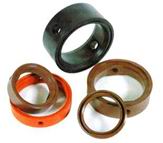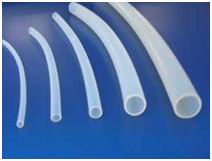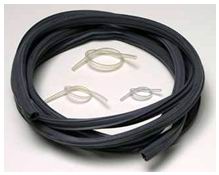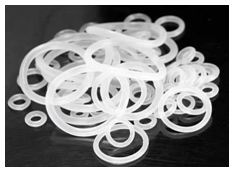 |
The first
silicone elastomers were
developed in the search for better insulating materials
for electric motors and generators. Resin-impregnated
glass fibers were the state-of
the-art materials
at the time. The glass was very heat resistant, but the
phenolic resins would not withstand the higher
temperatures that were being encountered in new smaller
electric motors. Chemists at Coring
Glassand
General Electric were
investigating heat-resistant materials for use as
resinous binders when they synthesized the first
silicone polymers, demonstrated that they worked well
and found a route to produce polydimethylsiloxane commercially. |
|
| |
|
Properties
Silicone rubber offers good resistance to extreme
temperatures, being able to operate normally from −55 °C to
+300 °C. At the extreme temperatures, the tensile strength,
elongation, tear strength and compression set can be far
superior to conventional rubbers although still low relative
to other materials. |
|
Organic rubber has
a Carbon to
carbon backbone which can leave them susceptible to
ozone, UV heat and other ageing factors that silicone rubber can
withstand well. This makes it one of the elastomers of
choice in many extreme environments.
Compared to organic rubbers,
however, silicone rubber has a very low tensile
strength For
this reason, care is needed in designing products to
withstand even low imposed loads. The material is also
very sensitive to fatigue rom
cyclic loading. Silicone rubber is a highly inert
material and does not react with most chemicals. Due to
its inertness, it is used in many medical applications
and in medical implants. |
 |
|
|
·
Silicone rubber is a synthetic rubber that can
withstand extremes in temperature that would destroy natural
rubber. The properties of silicone rubber remain constant
when cooled to negative100 degrees Celsius or heated to 250
degrees Celsius. This characteristic of silicone rubber
makes it an excellent choice for use in kitchen appliances
for either freezing or cooking food. Silicone rubber is a
popular choice for window and door seals because it can
withstand extreme temperatures but is a good insulator. Thus
it will help to keep your house cool in the summer and warm
in the winter. |
 |
Flexibility
·
Silicone rubbers are very flexible due to large
bond angles and bond lengths and can be elongated 100 to
1100 percent before they break. These large bonds can
move and change conformation to make for a flexible
material. They have a Shore hardness of 10 to 90 on the
A scale. This means that while silicone rubbers are
flexible, they are also resistant to scratches,
abrasions and wear. Silicone rubbers are particularly
remarkable for their extremely low glass transition
temperature. They remain flexible at temperatures as
cold as negative100 degrees Celsius. They tend to
stiffen up at very high temperatures, however. Silicone
rubbers are flexible but have a low tensile strength,
which means that care should be taken when silicone
rubbers are used in load-bearing applications. |
|
 |
Resistance
to Hydrocarbons, Oils and Solvents
·
Silicone rubbers are often used in medical
applications because they are extremely non-reactive and
resistant to hydrocarbons, oils and solvents. Silicone
rubber is a very popular material for medical implants
such as breast implants. While it is flexible and
durable, silicone rubber will not dissolve when exposed
to oils or other liquids. It is also extremely sanitary
since it has a silicone backbone instead of a carbon one
and is resistant to bacteria and germs. Silicone
rubber's resistance to oils and solvents makes it a good
choice for automotive and aeronautic applications since
is can function in oiled machines without heavy wear and
tear. |
|